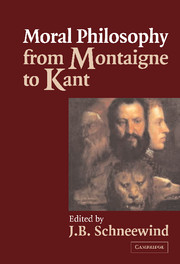Book contents
- Frontmatter
- Contents
- Preface
- Acknowledgments
- Foreword to the One-Volume Reprint
- Introduction
- PROLEGOMENA: SOME QUESTIONS RAISED
- PART I REWORKING NATURAL LAW
- PART II INTELLECT AND MORALITY
- PART III EPICUREANS AND EGOISTS
- PART IV AUTONOMY AND RESPONSIBILITY
- The Earl of Shaftesbury
- Francis Hutcheson
- Joseph Butler
- David Hume
- Christian August Crusius
- Richard Price
- Jean-Jacques Rousseau
- Thomas Reid
- Immanuel Kant
- Supplemental Bibliography
The Earl of Shaftesbury
Published online by Cambridge University Press: 05 June 2012
- Frontmatter
- Contents
- Preface
- Acknowledgments
- Foreword to the One-Volume Reprint
- Introduction
- PROLEGOMENA: SOME QUESTIONS RAISED
- PART I REWORKING NATURAL LAW
- PART II INTELLECT AND MORALITY
- PART III EPICUREANS AND EGOISTS
- PART IV AUTONOMY AND RESPONSIBILITY
- The Earl of Shaftesbury
- Francis Hutcheson
- Joseph Butler
- David Hume
- Christian August Crusius
- Richard Price
- Jean-Jacques Rousseau
- Thomas Reid
- Immanuel Kant
- Supplemental Bibliography
Summary
Introduction
Anthony Ashley Cooper, who became the third earl of Shaftesbury upon the death of his father in 1699, was born in 1671. His grandfather, the first earl, was a central figure in the Whig party during the seventeenth century. The first earl took charge of his grandson's education, placing him under the tutelage of John Locke, who was the household physician and adviser to the whole family. As a young man. Cooper traveled on the Continent for several years, and in 1695 he was elected to a seat in Parliament. He served for three years and continued to attend sessions when he was elevated to the House of Lords, but his poor health made it necessary for him to stay away from London as much as possible. Eventually he was forced to move to Italy in the hope that he could survive in the warmer climate. But in 1713 he died in Naples, leaving behind a widow and one son.
His chief work is a series of essays, collected first in three volumes under the title Characteristics of Men, Manners, Opinions, Times (1711). The most overtly philosophical of these essays is the one of most significance in the history of ethics, the Inquiry Concerning Virtue or Merit. The other essays deal with art, morals, religion, literature, politics, and the proper manner of living. In an elaborate style, often playful, often mocking, sometimes exhortative, sometimes biting and trenchant, they expose the reader not so much to a system as to a personality.
- Type
- Chapter
- Information
- Moral Philosophy from Montaigne to Kant , pp. 483 - 502Publisher: Cambridge University PressPrint publication year: 2002



